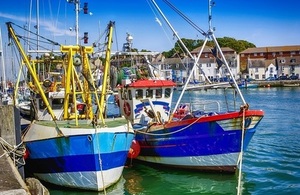Fishing industry in 2015 statistics published
The Marine Management Organisation (MMO) has published its annual UK Sea Fisheries Statistics 2015.

Commercial Fishing boats in Weymouth harbour, UK
It includes details on the UK fleet, the number of fishermen, the quantity and value of UK landings, international trade, worldwide fishing and the state of key stocks.
The report highlights that in 2015:
- The quantity and value of sea fish (which include shellfish) landed by UK vessels has decreased by 7 per cent and 10 per cent respectively on 2014.
- UK vessels landed 708 thousand tonnes of sea fish into the UK and abroad with a value of £775 million.
- The decrease in landings was primarily driven by an 11 per cent decrease in pelagic landings, due to a fall in mackerel quota from the peak in 2014.
- Pelagic landing are still far higher than they were a few years ago. Mackerel and herring accounted for almost half of UK fleet landings (48 per cent) but a lower share in value (25 per cent).
- The Scottish and Northern Irish fleets caught mainly pelagic fish. Demersal fish account for the highest share of the English fleet’s catch and shellfish are predominately caught by the Welsh fleet.
- The UK fishing fleet remained seventh largest in the EU in terms of vessel numbers, with the second largest capacity and fourth largest engine power.
- Seventy three per cent of the quantity landed by the UK fleet was caught by vessels over 24 metres in length which accounted for 4 per cent of the total number of UK vessels. These vessels tend to catch lower value pelagic fish, their overall share of the value of the UK catch is 57 per cent.
- Around 12,100 fishermen were active in the UK. Over 1,900 were part-time.
- Scottish vessels accounted for 62 per cent of the quantity of landings by the UK fleet while English vessels accounted for 29 per cent.
- Peterhead remained the port with the highest landings – 127 thousand tonnes with a value of £111 million.
- Plymouth had the highest quantity of landings in England – 13,400 tonnes with a value of £15 million, closely followed by Brixham with 12,400 tonnes but with the higher value of £23 million.
- Exports of fish decreased by 12 per cent to 443 thousand tonnes compared with 2014. Over the same period, 681 thousand tonnes were imported, a fall of 6 per cent.
- World figures for 2014 showed that China caught the largest amount of fish, 15.0 million tonnes. Indonesia had the second largest catch at 6.0 million tonnes.
View the full UK Sea Fisheries Annual Statistics Report 2015.